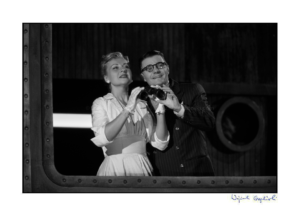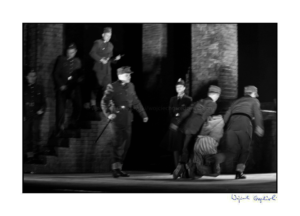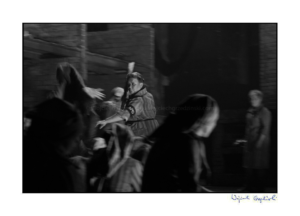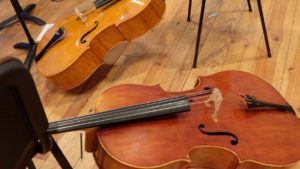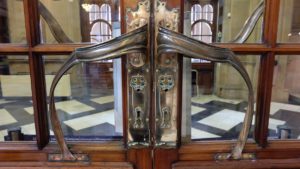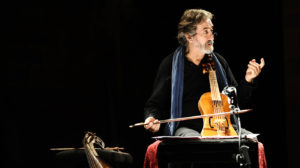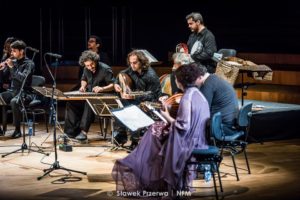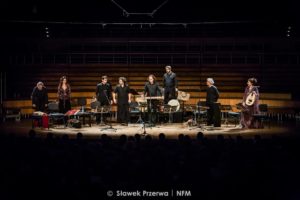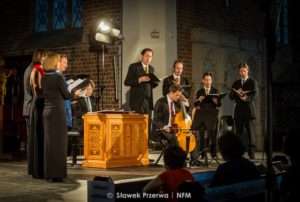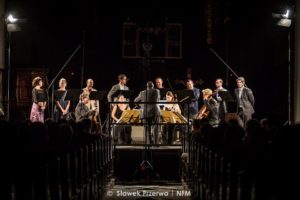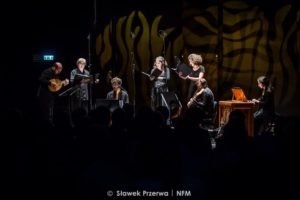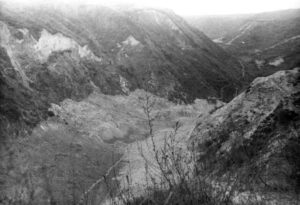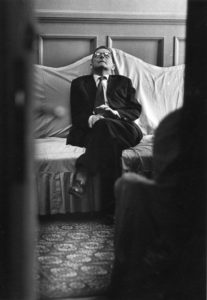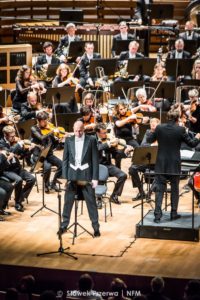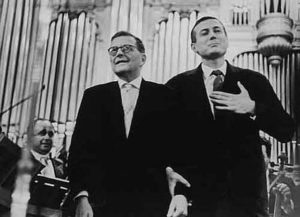Memory Painfully Recovered
When The Passenger made its appearance in Poland – in October 2010, a mere few months after its première in Bregenz, but no less than 42 years after the moment when Mieczysław Wajnberg finished work on the opera score – it was received with mixed feelings. We were not ready for its supposedly ‘imitative’ and ‘kitschy’ music, bringing to mind an association (as much irresistible as not entirely correct) with the œuvre of Shostakovich, who is still ‘out of the way’ for us – and that, not only for aesthetic reasons. We were not ready for a picture of everyday life in a Nazi concentration camp, placed in theatrical brackets, as it were, by stage director David Pountney and stage designer Johan Engels, but nonetheless a shocking view of cattle cars, crematorium ovens, muddied and bloodied prison-striped uniforms – especially in combination with the unreal white of the transatlantic liner ‘sailing’ in the upper portion of the stage. We were not ready for yet another, at first glance simplified adaptation of Zofia Posmysz’s text, made by the libretto’s author, Wajnberg’s and Shostakovich’s friend Aleksandr Medvedev. Disoriented critics meandered about in tangles of oblique statements, hesitating to reject the work of a miraculously-salvaged Polish Jew, but still refusing to recognize the timeless value of his work. Despite the tears and emotions of some viewers, the opera was considered a curiosity – worth mentioning, but too literal for the sensibilities of a Polish audience accustomed to expressing still-living traumas in the distanced language of symbols.
After that, Pountney’s staging – prepared in co-production with Teatr Wielki – Polish National Opera in Warsaw, Teatro Real in Madrid and the English National Opera in London – set out to tour the world. In January 2014, it reached the United States: first, appearing on the stage of the Houston Grand Opera; and several months later, at New York’s Lincoln Center Festival. American reviewers unanimously recognized it as one of the biggest events of the season. In Poland, the time has come for renewed reflection, supported by the gradual but inexorable entrance of the rest of Wajnberg’s œuvre onto the world’s stages, in the rendition of artists who had no reason to enrich their repertoire with his compositions for any motives other than purely musical ones. In May 2013, The Passenger saw its first performance in Germany, at the Badisches Staatstheater Karlsruhe, in the staging of Holger Müller-Brandes. The stunned critics spared nothing in their praise for the work. Received with equal enthusiasm was last year’s staging by Anselm Weber at the Frankfurt Opera. The admiration of the conservative Americans was still somehow explainable, but the Germans, who have for years been traveling the path of the musical avant-garde and contemporary theater? And whence the distance of Polish audiences to the son of Jewish actress Sonia Karl and her husband, violinist Szmul Wajnberg, who gained his first musical experiences at variety theaters and in Warsaw dance halls?
Photo: Wojciech Grzędziński.
Perhaps from some Nietzschean resentment, from a need to create illusory moral appraisals, aiming to make up for our own weakness: an inability to probe into the worldview of a person who went through not a few hells in his lifetime. As I wrote after The Passenger’s Warsaw première, Wajnberg was the only one in his family to survive the Holocaust, because he escaped to the East: his parents and his sister Estera remained in Poland. After being interned in the Łódź ghetto, they ended up in the concentration camp in Trawniki, near Lublin. They died during the infamous ‘Operation Harvest Festival’, carried out on 3 November 1943 on the orders of Himmler, after the prisoner rebellion in the death camp at Sobibór. At the same time, after four years spent in Minsk and Tashkent, Wajnberg settled for the rest of his life in Moscow. He married the daughter of Solomon Michoels, a distinguished actor and stage director, as well as the leader of the Jewish Anti-Fascist Committee. In January 1948, when Stalin began to persecute the organization’s members, Michoels died from being pushed under a truck. The perpetrators were never found. In 1953, Wajnberg was arrested on an accusation of ‘bourgeois Jewish nationalism’ – as the result of a gigantic anti-Semitic provocation to which people associated with the Committee and with advocates of the founding of an autonomous Jewish republic in Crimea fell victim. At that time, Shostakovich promised Wajnberg that should the latter be arrested, he would take care of Wajnberg’s daughter from his marriage to Natalia Michoels. He interceded for him with Lavrenty Beria, chief of the NKVD. Who knows how the two composers’ subsequent fortunes would have played out if Stalin had not died; Wajnberg got out of jail after a few weeks, with acute symptoms of the spinal tuberculosis that had been plaguing him for years, but nonetheless – free and still paradoxically overconfident in the effectiveness and justice of the Soviet government system.
The same government that, in 1968, put on hold the already very advanced preparations for a staging of The Passenger at the Bolshoi Theater in Moscow – under the accusation of formalism and ‘abstract humanism’ – whatever was hidden behind that internally contradictory formula with which 20th-century totalitarian systems responded to all manifestations of independent thought. Who knows if the addressee of these accusations was not, above all, Medvedev, who ‘omitted’ the role of the Communist resistance movement at Auschwitz from the libretto. The causes for The Passenger’s ‘arrest’ remain unclear to this day. Perhaps it was a matter of exaggeration – in the Soviets’ opinion – of the subject of the Holocaust in combination with the enormous number of Soviet victims of World War II, or perhaps fears arose that the camp subject matter would bring to viewers’ minds undesirable associations with the here-and-now of the forced-labor camps that were holding political prisoners despite the official dissolution of the Gulag by decision of the Ministry of Internal Affairs in 1960. Medvedev compared Wajnberg’s opera to the Count of Monte Cristo, arrested and condemned to imprisonment in a fortress based on a false anonymous denunciation. Not long before his death, the composer confessed that he considered The Passenger to be the most important work in his œuvre. Medvedev promised him that he would listen to any première of the work that took place twice as carefully: once for himself and once for Wajnberg. He kept his promise ten years after the composer’s death, in December 2006 at a concert organized in a semi-staged version at the Composers’ House in Moscow. Just under four years later, there was a single concert performance of The Passenger at the Novosibirsk Opera. In July 2010, the aforementioned première in Bregenz took place with an ensemble of soloists from several different countries, including Poland, as well as the Prague Philharmonic Choir and the Wiener Symphoniker under the baton of Teodor Currentzis.
Photo: Wojciech Grzędziński.
In Russia – despite the success of Pountney’s staging and growing interest in the rest of the composer’s œuvre – Wajnberg’s name has been associated at best with music for circus shows and animated films, among others the Soviet adaptation of Winnie the Pooh. It was for this reason that we so impatiently awaited the Russian première of the Passenger at the Ekaterinburg Opera, prepared as part of a project initiated in 2015 in collaboration with the Adam Mickiewicz Institute. The curators of the endeavor, theater director Andrei Shishkin and editor-in-chief of the Muzykalnoye Obozrenie monthly Andrei Ustinov, received the ‘blessing’ of Zofia Posmysz on the occasion of their visit to Warsaw. American stage director and designer Thaddeus Strassberger visited the Auschwitz camp last fall. Slovak conductor Oliver von Dohnányi had previously collaborated with Strassberger in Ekaterinburg on the first Russian staging of Glass’ opera Satyagraha, the winner of two Golden Masks; this close-knit production team was joined by costume designer Vita Tzykun, born in Odessa and raised in Tel Aviv, now permanently resident in New York.
I was afraid of this première. Pountney and Engels’ vision, played out on two levels – the snow-white transatlantic liner and the grim reality of the camp – connected by a ramp for the cattle cars bringing in prisoners, made a (despite everything) coherent and clear impression. The most annoying thing about the Bregenz staging – namely the artificial, exaggerated theatrical gesture – seemed somehow inevitable, resulting from the impossibility of taking a distance to this not yet worked-through trauma and dressing it up in metaphor. I remembered Wajnberg’s music – imbued with a host of stylistic references, not averse to pastiche, supersaturated with the fatalism of Berg’s Wozzeck, the tragedy of Britten’s Peter Grimes and a grotesque element in the spirit of Shostakovich – above all for its heartbreaking episodes that did not always want to arrange themselves into a convincing narrative. If we were to make this theatrical tale even less realistic, beat the horror into a symbol, it could sink into the void. If we were to literalize it, it would smack of parody – highly inappropriate under the circumstances. I was curious how Strassberger would resolve this dilemma. I did not expect him to do it with the simplest theatrical means possible, which would tie the opera together into a whole so shocking that at times there was no way to hold back the tears.
Strassberger – unlike Pountney – did not go the route of parallel worlds between which something along the lines of osmosis occasionally takes place, but which as planes of existence remain separate, frightfully contrasting in every way, starting with the emotional layer and finishing with the aesthetic level. In the Ekaterinburg production, the world of Auschwitz and the world of a floating luxury hotel merge together. Nothing here is completely clean; nothing is totally sullied. The scanty scenery changes slowly, almost imperceptibly. The nightmare of the SS-woman Liza, tormented by the pricks of conscience, is born before our eyes, cuts into our brain like a hypnotic meander into the depths of memory, recreating more and more traumatic episodes from the past, and thereafter projecting the memories onto a less and less familiar here and now.
Because this is an opera about memory. Supplied by its creators with a motto from Paul Eluard: ‘If the echo of these voices falls silent – we shall die.’ Liza, recovering repressed memories under the influence of an unexpected meeting aboard the ship, gradually reconstructs the collective memory of the Auschwitz tragedy. From now on, she will have to live with it: among the ghosts of prisoners and prison guards wandering around the deck, with the image of smoking crematoria moving beneath closed eyelids, of dirty pallets, of prison-striped uniforms smeared with mud, blood and human excreta. The scenery of both world orders is grim: the nightmare of Auschwitz clashes with the claustrophobic atmosphere of the transatlantic liner sailing to Brazil. From both of these places, there is apparently no escape. Except by death – whether in the fire of the ovens or in the depths of the ocean. In the opera’s epilogue, the fortunes of the SS-woman Liza are entwined forever with those of the prisoner Marta. The women sit in their cabins and look in their mirrors; Strassberger has suggested, however, that what they see in them is reflections of each other.
Photo: Wojciech Grzędziński.
All of this was supported by a gesture so distinct and so precisely-directed that it was even painful to watch what was happening onstage. Liza really was not able to recover from her shock; Marta at times really did stagger on her feet; the passengers on the transatlantic liner really did dance as best they could; Bronka really did die wracked by vomiting. The opera’s culminating scene (in which Tadeusz, Marta’s beloved, brings death upon himself by playing Bach’s Chaconne from the Partita in D minor for the Germans – instead of the expected trivial waltz) was played out at first glance the same way as in Pountney’s staging: by using a violinist double standing with his back to the audience. Strassberger, however, has added detail to the scene. Tadeusz starts to play with the stiff fingers of a person who has not touched a violin in two years. His Chaconne slowly takes on confidence and power; the Germans listen in stupefaction as Tadeusz shoves this national sacred cow into their ears like a gag down someone’s throat. There is no way to forget it.
Most importantly, however, Wajnberg’s music rid itself of long drawn-out passages, took on a pulse and came together into a terrifyingly coherent dramaturgical whole under the deft baton of Oliver von Dohnányi. The main protagonists sang with perfectly placed voices, conveying the text deliciously, accurately emphasizing the differences in characterization between the personages of the drama. The lyrical Marta (Natalia Karlova) contrasted emphatically with a Liza quivering on the verge of hysteria (Nadezhda Babintseva); the dramatic baritenor of Tadeusz (Dmitri Starodubov) created an ideal counterweight to the soft, though perhaps a bit too withdrawn tenor of Walter (Vladimir Cheberiak). The orchestra seasoned in Shostakovichian battles accurately underlined the ‘angularity’ of The Passenger’s score, but was able to retain the melancholy air associated with Bronka’s prayer in the Marian song Angelus ad Virginem missus; on the other hand, it was able to ‘deconstruct’ the waltz running through the entire opera so convincingly as to make it a symbol of the disintegration of Liza and Walter’s world, buckling under the load of wartime memories. The whole is supplemented by the choir, the peculiar collective protagonist of The Passenger, superbly prepared by Anzhelika Grozina.
When Wajnberg escaped to the USSR, a government official decided to change his name to Moisei. The composer waved his hand: ‘It can be Moisei, it can be Abram, as long as I can cross the border.’ In order to survive. The Passenger is an opera as much about the memory of Auschwitz as about survival strategy. In order to survive, sometimes one has to forget – one’s own name, one’s experiences as a camp guard, the tender touch of lovers separated by the war. In order to keep living, one has to recover that memory. Thanks to the efforts of the production team of the Ekaterinburg staging, Russia is beginning to recover its memory of Wajnberg. Let us hope that it learns to live with that memory.
Translated by: Karol Thornton-Remiszewski
Source: „Tygodnik Powszechny”

